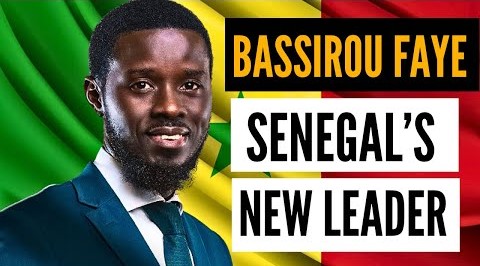Following Macky Sall’s election postponement mistake, which almost soiled Senegal’s enviable status as one of the few African states that has never experienced a coup d’état , the region’s democratic bulwark demonstrated her strength against undemocratic impulses, even setting a new record by electing the continent’s youngest democratically elected president to date.
Bassirou DiomayeFaye, a 44-year-old little-known anti-establishment candidate, who had just been freed from prison about 10 days before the election, after having been imprisoned since April 2023, won the Sunday, 24 March 2024 delayed poll, in a rather Mandela-esque manner, according to provisional results reported by both local and international media.
The election was supposed to take place on February 25, but Sall postponed the vote until the year-end – a decision that shocked the world and threatened to shake the foundations of Senegalese democracy.
After peaceful pro-democracy protests in the capital of Dakar, which were marked by violence, death and arrests, and international criticism of what many saw as a “constitutional coup” to stay in power for an extra-constitutional period, Sall caved in to pressure and declared a new date after the Senegalese Constitutional Court ruled, he could not remain in office beyond his 2 April term.
The President-elect’s opponent, Amadou Ba, a former Prime Minister and leader of the governing coalition, gracefully accepted defeat. “Considering the trends of the presidential election results and awaiting the official declaration, I congratulate President Bassirou DiomayeDiakhar Faye on his victory in the first round,” 62-year-old Ba said in the statement. Outgoing President Sallalso described Faye’s election as “a victory for Senegalese democracy” and said he “salutes the smooth running of the election” and “congratulates the winner, Bassirou Diomaye Faye, who the poll trends show as winning.” As of Monday, 25 March 2024 – Faye’s birthday – 13 of the 17 parties that ran in the election, had called to congratulate him.
Faye, who assumed the role of de facto leader of the opposition party Pastef following the disqualification of his mentor, opposition leader Ousmane Sonko, from the presidential race, has also received congratulations for his victory from the United States, the international community, and France, his former colonial master.
He has pledged to shift Senegal’s political orientation toward the left and an emphasis on Africa. He wants to combat corruption, reassess contracts for oil and gas with foreign companies, and more fairly distribute the nation’s wealth. He pledges to support youth and increase Senegal’s independence.
Senegalese citizens should be commended for their tenacity and perseverance in standing up for what is right, as well as for the democratic institutions that support them. Enormous crowds flocked to the streets to defend democracy. For democracy, they put their lives in danger and gave them up. They stood up to be tallied. They made sure Sall didn’t taint Senegal’s democratic path. They prevailed by standing up to a carefully thought out and skillfully carried out constitutional coup. They did not remain silent and watch from the sidelines as a democratically elected leader attacked democracy. They knew that the rest of Africa was looking on, waiting to do the same. They had to make sure Senegal, a democratic role model for many African nations in the unstable ECOWAS region, stayed the course because they knew a coup storm was overthrowing and destroying democracy in the area. They also didn’t want to give any funny ideas to mavericks who might want to ride the chaos to unconstitutional stardom, as has happened in eight African nations since 2020.
This year, Senegal will serve as an example for 18 other African nations who will elect new presidents and national assemblies, and the Center for Intelligence and Security Analysis (CISA) hopes and prays that they will take note. To foster confidence and trust in the outcome, the electoral bodies of those nations must rebuff any influence and control from the established powers and insist on fairness, transparency, and the freedom of the entire process. Furthermore, the security services must prevent themselves from being employed as instruments of tyranny against the populace. They have to come to the realization that they would fare better under a democratic regime than a dictatorship headed by military mavericks.
Senegalese people’s tenacity ought to serve as a warning to African leaders who have for too long taken their people’s power for granted. They must understand that republican constitutionalism and democracy were made possible by the same people power that overthrew powerful kingdoms and dynasties centuries ago. It is impossible to permanently stifle the power of the people. There comes a time when a generation believes that its only purpose in life is to give itself up as a sacrifice for those who have not yet been born, and no amount of suppression can quell that fervour when the time comes..
We commend the Senegalese people for serving as an example for the rest of Africa, portraying the continent well, and denying the West another chance to splatter evil pictures of poverty, squalor, and conflict on their television screens.
Africa’s youth are challenged and inspired to rise to the occasion by Faye’s victory. In Africa, a new era of leadership is beginning. The leaders of the continent shouldn’t always be elderly, weak, grandfathers with grey hair.It offers hope that bright young people with new ideas can be developed into African leaders. They can relate to the goals of the current generation and have a deeper understanding of them. Africa has attempted to elect a lot of elderly people to leadership positions, but the continent hasn’t witnessed many successes. If the youth are given the mantle, maybe they can alter the course of events.
We wish Faye well. We wish the people of Senegal well.






























